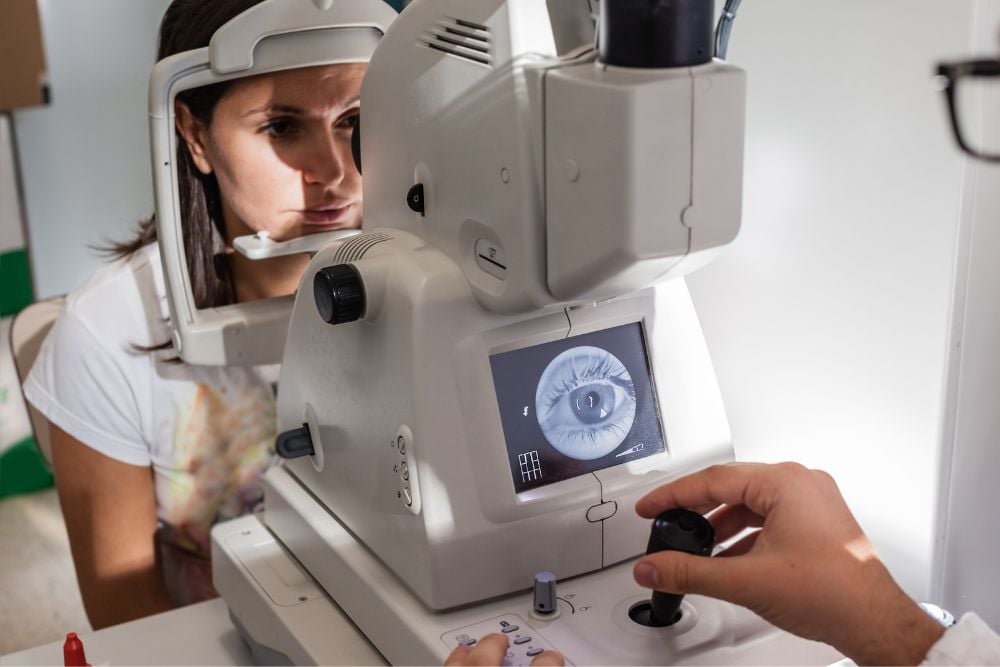Living with Retinitis Pigmentosa: Coping Strategies and Support Resources

Often diagnosed in childhood or adolescence, retinitis pigmentosa (RP) is an inherited retinal disease that causes progressive loss of peripheral vision and night vision. It often leads to legal blindness (i.e., a corrected vision of 20/200 in their best-seeing eye) and sometimes to complete blindness. Although there is no treatment for retinitis pigmentosa, you can learn to cope and get help managing symptoms of progressive vision loss.
What Is Retinitis Pigmentosa?
RP is not a single disorder, but rather a group of inherited diseases that causes retinal degeneration and vision decline. The retina contains photoreceptors, which convert light into electrical signals that are interpreted as visual images in the brain. In people with RP, these photoreceptors deteriorate over time.
Living with Retinitis Pigmentosa
People with RP typically have trouble seeing well in the dark and going from a dark to a bright room or environment. Tunnel vision, with just a small area of clear vision in the middle of the visual field (i.e., central vision), is also common. People living with retinitis often struggle with mobility and the performance of activities of daily living (ADLs). ADLs include daily tasks such as dressing, bathing, and cooking,
Managing Life with Retinitis Pigmentosa
Although having RP can pose a daily struggle for many people with the disorder, there are many services and resources available for people living with RP and their family members.
Coping Strategies
Many coping strategies can improve the daily lives of those living with RP, including:
- Lighting your home evenly and brightly
- Learn how to navigate safely with a service animal
- Using aids, such as magnifiers, can assist in seeing details
- Make items in your home, such as light switches, more visible by using color contrast
- Taking advantage of smartphones and tablets which have specialized features to make the technology accessible for people with visual problems
- Have a low vision assessment (LVA) and explore other options that can help make the most of the vision you do have as your vision loss progresses
- Work with a team of specialists, such as occupational therapists and mobility specialists to learn strategies for safely getting around and performing ADLs at home
Study on Coping Strategies
In a study published by the Journal of the American Optometric Association, the coping strategy most commonly used for dealing with the stress from vision loss was humor. Study participants reported that laughter helped them come to terms with living with RP. Using social support and sharing feelings with others who have RP was another successful way to cope that was identified by focus group members. In addition, other forms of coping, such as giving yourself permission to “gripe or complain” and using distraction were associated with being able to cope more effectively with visual decline.
Resources and Support
You can find others to connect with on Facebook groups and other online communities to get and give peer support to others who understand exactly what you are going through.
Support groups
People with conditions that significantly impact their vision can benefit from connecting with one another. Real-life experiences allow people with a common diagnosis to share tips and advice, based on their understanding of the disorder and experience going through the physical limitations and emotional aspects of living with visual impairment.
Supporting Children with RP
Children with RP require a lot of ongoing support for coping with the disorder, particularly when experiencing feelings of uncertainty about the future. Building confidence and maximizing a child’s potential through every stage of RP can be facilitated with the appropriate level of support from an early age.
Helping a child cope with RP may include:
- Maintaining a tidy home without obstacles, storing frequently used items in consistent locations
- Informing your child’s school of their condition and how they are affected by it.
- Tuning into the child’s emotional needs and providing support regarding their feelings about having RP
- Asking your child’s school staff how to locate a certified visual impairment teacher
Resources
Listed below are some online resources and supportive services for people with visual impairment.
- Duke Eye Center: Vision Rehabilitation and Performance -- Patients with vision loss benefit from Duke's cutting-edge vision rehabilitation center and occupational therapy program.
- Hadley: Partner of The National Eye Institute -- Anyone with a visual impairment, their families, and professionals supporting them, can get practical help, connection, and support from Hadley free of charge.
- The Low Vision Shop -- Offers a wide range of assistive devices, including wearable technology and other devices for low vision and blindness. The Low Vision Shop also offers virtual events, webinars, sponsorship, and social media support.
Future treatments in development for retinitis pigmentosa
There are promising treatments on the horizon that may benefit people with RP. Most are still being tested, and it will likely be several years before they become available to patients. Gene therapy and stem cell therapy hold promise. As one example, Luxturna was developed by Spark Therapeutics and approved by the U.S. Food and Drug Administration targets a rare and very specific gene mutation.
See Your Ophthalmologist for Regular Checkups
If you have retinitis pigmentosa, you may develop visual impairments that affect your daily life. As your vision changes, it's natural to be concerned, but you and your family have an opportunity to access resources and support to help you. Contact us at Vitreoretinal Consultants in Long Island, Queens, Manhattan, and Westchester to learn more about managing retinal pigmentosa.


